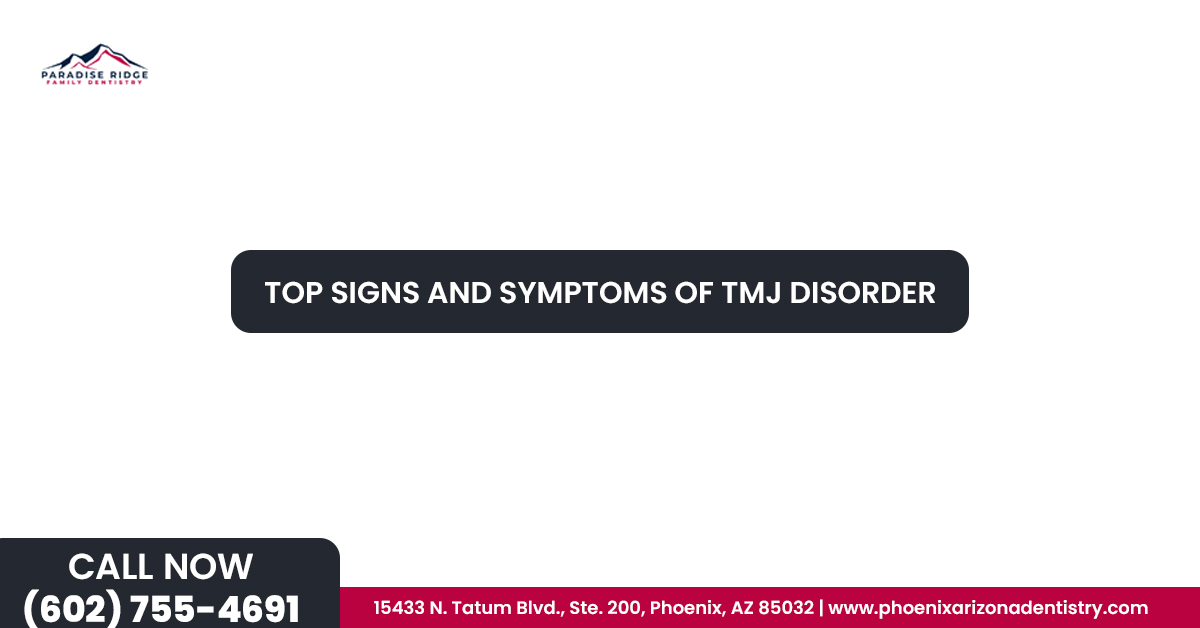The signs and symptoms of TMJ disorder may slowly disrupt normal function before increasing into chronic pain. Speaking, eating, and facial movement all depend on the temporomandibular joint (TMJ), which runs where the jaw joins the skull. Early detection of TMJ symptoms and indicators can improve quality of life, prevent issues, and ease suffering.
Table of Contents
What Is TMJ Disorder?
The temporomandibular joint connects the lower jaw to the skull. TMJ disorder is a group of problems with this joint. This joint operates as a hinge, controlling movement needed for actions like talking or biting. The condition may arise from varied causes ranging from arthritis and trauma to habitual clenching or misalignment.
Inflammation, joint wear, or muscular stress surrounding this joint can cause persistent symptoms. Though frequently temporary, untreated cases may advance into long-term health concerns. It’s essential to understand what are some signs and symptoms of TMJ to detect it at its earliest stage.

Top Signs And Symptoms Of TMJ Disorder
Several common signs and symptoms of TMJ disorders reveal themselves gradually, making early detection vital:
- Jaw Pain or Tenderness: – One of the most common symptoms is continuous jaw pain, particularly at the joint or surrounding muscles. This discomfort may increase during chewing or speaking.
- Clicking or Popping Sounds: – An audible popping or clicking sound when opening or closing the mouth can suggest joint dysfunction. While not always painful, it’s one of the most recognizable signs and symptoms of TMJ disorders.
- Limited Jaw Movement: – Difficulty in fully opening or closing the mouth, or a sensation of the jaw locking, often points to joint misalignment or inflammation. This limitation is among the more frustrating signs and symptoms of TMJ disorders.
- Facial Pain or Tension: – The surrounding facial muscles may experience tightness or aching due to continuous strain on the TMJ, frequently characterized as widespread facial discomfort.
- Headaches or Migraines: – TMJ dysfunction frequently results in tension headaches or migraines, triggered by strained jaw and facial muscles. For many, these headaches become more frequent without TMJ Treatment.
- Neck and Shoulder Stiffness: – TMJ pain frequently impacts posture, especially when clenching or grinding occurs. This results in discomfort spreading across the neck and shoulders.
When To See A Dentist? Seeking Relief From TMJ? Expert Evaluation Starts Here
Chronic pain, discomfort during chewing, or jaw clicking should not be ignored. Dental professionals, particularly those experienced with TMJ concerns, provide customized evaluations and effective treatment plans. Those wondering what are some signs and symptoms of TMJ that demand immediate attention should be aware of symptoms such as jaw locking, severe migraines, or facial pain.
Paradise Ridge Dentistry offers comprehensive assessments and gentle, Modern TMJ Treatment for those experiencing signs and symptoms of TMJ disorders. Each treatment plan focuses on reducing inflammation, improving jaw alignment, and relieving muscle tension without unnecessary interventions. The team addresses each case with care, allowing patients to regain comfort and confidence. The clinic delivers trusted dental care designed to improve comfort and function. As a recognized provider of TMJ-focused services, the practice offers detailed evaluations, personalized therapies, and advanced techniques to ease signs and symptoms of TMJ disorders.
Conclusion
Understanding the signs and symptoms of TMJ can be essential for slowing development and avoiding more treatments later. From jaw pain and facial tension to migraines, these symptoms affect overall well-being. Early recognition of what are some signs and symptoms of TMJ can lead to timely dental support and longterm relief.
For those experiencing discomfort, Paradise Ridge Dentistry offers TMJ consultations and care that prioritize comfort, education, and non-invasive strategies. Don’t allow persistent symptoms to remain unaddressed precision-focused TMJ care can restore natural function and ease.



